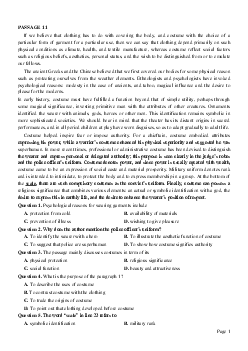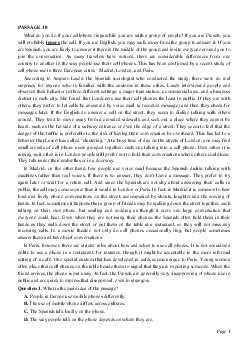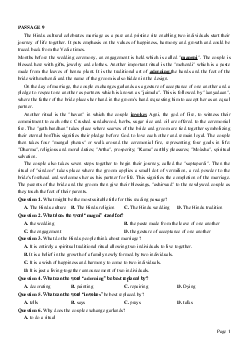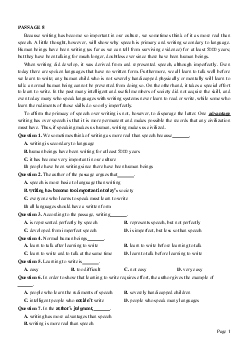


Preview text:
PASSAGE 13
Millions of people are using cell phones today. In many places, it is actually considered unusual not to
use one. In many countries, cell phones are very popular with young people. They find that the phones are
more than a means of communication - having a mobile phone shows that they are cool and connected.
The explosion in mobile phone use around the world has made some health professionals worried. Some
doctors are concerned that in the future many people may suffer health problems from the use of mobile
phones. In England, there has been a serious debate about this issue. Mobile phone companies are worried
about the negative publicity of such ideas. They say that there is no proof that mobile phones are bad for your health.
On the other hand, medical studies have shown changes in the brain cells of some people who use mobile
phones. Signs of change in the tissues of the brain and head can be detected with modern scanning
equipment. In one case, a traveling salesman had to retire at young age because of serious memory loss.
He couldn't remember even simple tasks. He would often forget the name of his own son. This man used
to talk on his mobile phone for about six hours a day, every day of his working week, for a couple of
years. His family doctor blamed his mobile phone use, but his employer's doctor didn't agree.
What is it that makes mobile phones potentially harmful? The answer is radiation. High-tech machines
can detect very small amounts of radiation from mobile phones. Mobile phone companies agree that there
is some radiation, but they say the amount is too small to worry about.
As the discussion about their safety continues, it appears that it's best to use mobile phones less often. Use
your regular phone if you want to talk for a long time. Use your mobile phone only when you really need
it. Mobile phones can be very useful and convenient, especially in emergencies. In the future, mobile
phones may have a warning label that says they are bad for your health. So for now, it's wise not to use your mobile phone too often
Question 1. According to the passage, cell phones are especially popular with young people because .
A. they make them look more stylish.
B. they keep the users alert all the time.
C. they cannot be replaced by regular phones.
D. they are indispensable in everyday communications.
Question 2. The word "means" in the passage most closely means . A. meanings B. expression C. transmission D. method
Question 3. Doctors have tentatively concluded that cell phones may .
A. cause some mental malfunction
B. change their users’ temperament.
C. change their users’ social behaviors.
D. damage their users’ emotions.
Question 4. "Negative publicity" in the passage most likely means .
A. widespread opinion about bad effects of cell phones.
B. information on the lethal effects of cell phones.
C. the negative public use of cell phones.
D. poor ideas about the effects of cell phones.
Question 5. The changes possibly caused by the cell phones are mainly concerned with . Page 1
A. the smallest units of the brain.
B. the mobility of the mind and the body.
C. the resident memory.
D. the arteries of the brain.
Question 6. The man mentioned in the passage, who used his cell phone too often, .
A. had a problem with memory.
B. abandoned his family.
C. suffered serious loss of mental ability.
D. could no longer think lucidly.
Question 7. The word "potentially" in the passage most closely means . A. certainly B. obviously C. privately D. possibly
Question 8. According to the passage, what makes mobile phones potentially harmful is .
A. their radiant light.
B. their raiding power.
C. their power of attraction.
D. their invisible rays.
Question 9. According to the writer, people should .
A. keep off mobile phones regularly.
B. never use mobile phones in all cases.
C. only use mobile phones in medical emergencies. D. only use mobile phones in urgent cases.
Question 10. The most suitable title for the passage could be .
A. Technological Innovations and Their Price.
B. The Way Mobile Phones Work.
C. The Reasons Why Mobile Phones Are Popular.
D. Mobile Phones: A Must of Our Time ĐÁP ÁN 1-A 2-D 3-A 4-A 5-A 6-A 7-D 8-D 9-D 10-A
LỜI GIẢI CHI TIẾT Question 1:
“They find that the phones are more than a means of communication - having a mobile phone shows that
they are cool and connected.”
-> Cool đồng nghĩa với fashionable hoặc stylish. Question 2:
a means of communication: phương tiện/ cách thức giao tiếp. Do đó, “means” đồng nghĩa với method. Question 3:
“In one case, a traveling salesman had to retire at young age because of serious memory loss. He couldn't
remember even simple tasks. He would often forget the name of his own son. This man used to talk on his
mobile phone for about six hours a day, every day of his working week, for a couple of years. His family
doctor blamed his mobile phone use, but his employer's doctor didn't agree.”
-> Như vậy việc dùng điện thoại di động có thể gây ảnh hưởng đến các chức năng về mặt thần kinh. Đáp
án của câu là cause some mental malfunction. Question 4: Page 2
“In England, there has been a serious debate about this issue. Mobile phone companies are worried about
the negative publicity of such ideas.”
-> “ Negative publicity” có nghĩa là việc làm cho công chúng biết đến những mặt tiêu cực hoặc ảnh
hưởng xấu của điều gì đó. Đáp án của câu trên là B (widespread opinion about bad effects of cellphones). Question 5:
“On the other hand, medical studies have shown changes in the brain cells of some people who use
mobile phones”. Brain cells = the smallest units of the brain: tế bào não Question 6:
“In one case, a traveling salesman had to retire at young age because of serious memory loss. He couldn't
remember even simple tasks.” Question 7:
“What is it that makes mobile phones potentially harmful?” Xét trong ngữ cảnh của câu potentially có
nghĩa là “có thể”, do đó từ có nghĩa gần nhất với nó là possibly. Question 8:
Giải thích: “What is it that makes mobile phones potentially harmful? The answer is radiation.”
Radiation chính là những tia vô hình - invisible rays. Question 9:
“Mobile phones can be very useful and convenient, especially in emergencies.”
emergencies = urgent cases: những trường hợp khẩn cấp. Question 10:
Bài đọc đề cập đến 2 mặt của một vấn đề. Tác giả đưa ra sự tiện lợi hữu ích của điện thoại di động đồng
thời cũng nêu lên những tác hại có thể gây cho con người. Đề tựa phù hợp nhất cho bài đọc trên là:
“Technological Innovations and Their Price” vì nó thể hiện được đúng nội dung của bài. Page 3




